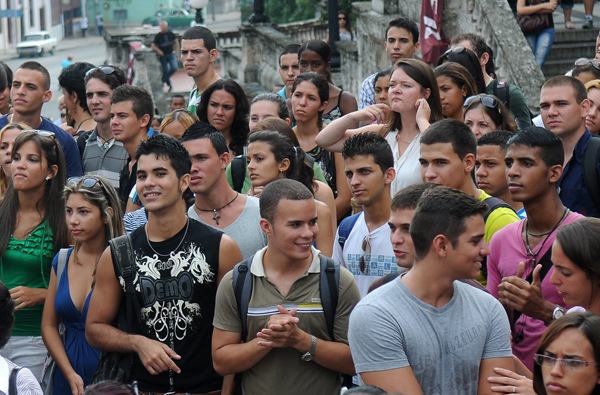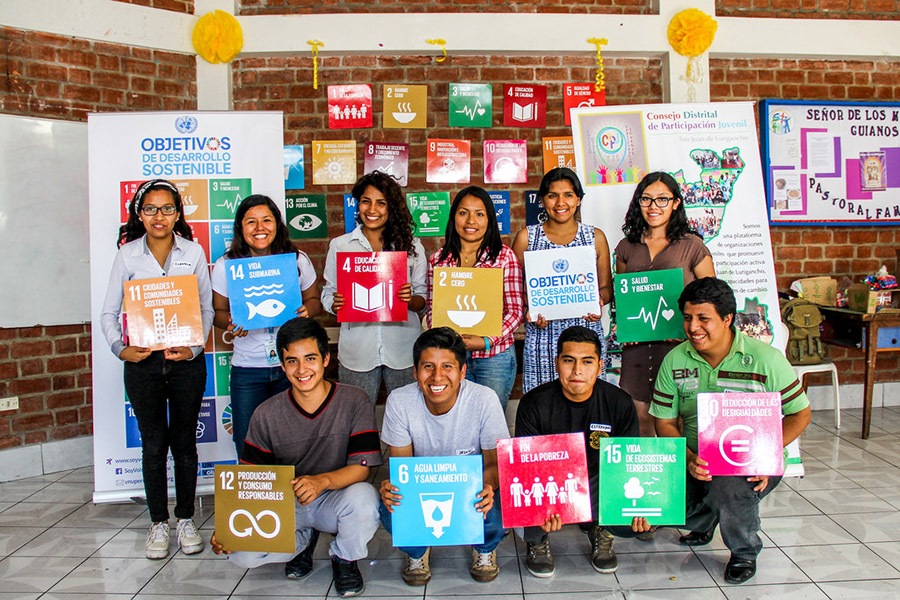RIO DE JANEIRO, BRAZIL – “We were so banal.” The voice of Francisco Fernández Soto, a 21-year-old Peruvian student who lives in Lima, bears a guilty note. Before the coronavirus, being young “was to think that you had your whole life ahead of you,” he says.
A few months ago, he felt he could take two gap years and then catch up. But Covid-19 totally changed his perception of time. Life stopped, and the future was swallowed up by uncertainty. Now that he has been fired “overnight” from his job as a trainee in the newspaper Correo – as part of the mass layoffs by various media outlets in recent months, among them El Comercio del Perú – thinking about the days to come means rethinking who he wants to be and how he wants to live.
The pandemic has paused the routine of millions of youths around the world. It has led them to reconsider their priorities, their ways of life, their goals. They stopped imagining an inclusive future filled with opportunities to reinvent themselves in an intimidating present. No one knows the real cost of the crisis caused by the Covid-19 shutdown, but projections suggest that youths aged 18 to 25 will get the worst of it.

And Latin America will be one of the regions that will pay most dearly. Faced with the prospect of an embargoed future, the continent’s Generation Z is clinging to the notion of building a new, more conscious normalcy on issues like climate change, social inequality and the feminist movement. But its members know it will be difficult: the economy is now at the root of their concerns.
Complete college, find a suitable job, perhaps even start his own venture, become independent, leave his parents’ home. Fernández Soto enumerates a mental list that he has reconfigured in recent weeks to the question of what he expects from the future. “My main concern is that, because of me or a pandemic, I’ll end up living at home forever,” he acknowledges.
The old promises of progress in exchange for effort – having access to one’s own home after many years of work, pursuing a university career to ensure a good future, for instance – had already begun to crumble for Generation X (those born between 1965 and 1979 on average) and Generation Y (the celebrated millennials, born between 1980 and 1995). With little work experience and no savings, the centennials (born between 1996 and 2010) are following the path of their predecessors and see these perspectives becoming more and more distant. Fernández Soto’s concern about not being able to become independent stems from the accounts of most of his friends, who were forced to move back in with their parents after losing their jobs in recent months. “No matter what we do, it remains in our subconscious as a step backwards,” he says.
Like Fernández Soto and his friends, at least one in six youths lost their jobs during the pandemic, according to the latest report by the International Labor Organization (ILO). Those between the ages of 15 and 24 have been “disproportionately” affected, with even deeper damage to women.
Before the pandemic, countries like Brazil, Uruguay and Argentina had youth unemployment rates close to 30 percent, a figure much higher than the regional average (19 percent). “The crisis is affecting youths more severely and faster than any other group. If we don’t take immediate action, the legacy of the virus could remain with us for decades,” warned ILO Director General Guy Ryder.
In Latin America, that projection is like tossing dirt on what was already buried. “It’s a generation that had few prospects for the future,” says Pedro Núñez, a researcher at the Latin American Faculty of Social Sciences (FLACSO) in Argentina. Núñez has been studying youth for years, and points to instability as the key factor in understanding centennials: “Bonds are more unstable, work is more precarious, educational trajectories are more intermittent, and all of this is deepened by the pandemic.”
“When can we breathe again?”
Georgia Rhote, 25, would like to picture where she’d be in five or ten years’ time. Born in Maracaibo (Venezuela), she studied law and moved to Buenos Aires in 2018 for an internship. Her future was uncertain before the pandemic, she explains, because she was a migrant. But now the possible avenues are starting to fade. “One of the great consequences of that is not being able to trace one’s life,” she says. In her case, the challenge is greater because she is “a woman, young and racialized,” she says, as if describing an obstacle course. “If it was already difficult for youths to find work, all this will make it much more unfeasible. They’ll ask you to have 30 years experience, but 25 years of age,” she jokes.
Psychology student Thais da Costa Oliveira, 21, has seen her plans thwarted as the pandemic advances in Brazil. In Rio, where she lives, she saw her college classes, wedding plans and her venture paralyzed. She opened a stationery store in February, and the business never had time to take off. “I decided to start at a very bad time,” she says. As the country’s cases increased, so did her worries. “I’m distressed because I don’t know when all this will end, when we’ll be able to breathe again.”
The economic factor has become indigestible news for young people. “When I start to hear that the GDP will drop ‘so many percent’ and that markets are expected to collapse, it gives me a tremendous sense of uncertainty,” says Sofía Laudanno, a 24-year-old medical student from Argentina. “I turn the TV off because I can’t handle it.”
The consequences of the collapse are so frightening for the young that over half of those who lost their jobs had mental health issues – with periods of anxiety and panic attacks – according to an ILO survey. The Covid-Stress international scientific study shows that in Mexico the centennials are the most stressed group by the current situation, followed by the millennials. And their main concern is the economy. Preliminary data from other countries in the region, which will be released in coming weeks, tend to point in the same direction.
“It’s a very difficult time for us,” says Colombian Daniel Suárez Álvarez. This 22-year-old economics student suffers from depression, a diagnosis that has deepened with the uncertainty and lockdown. The anxiety attacks have multiplied, and he has had to ask for psychiatric help. “We, the youths, are more aware of mental health and we say: the way I overload myself at work is doing me harm. There is nothing heroic about not sleeping; in fact, it affects me physically and emotionally. It’s not about surviving, it’s about living and well being.”

The careers of the future without a present
Among the prospects that waver due to the pandemic is the promise that a university degree would lead to a better future. The huge sums that students have to pay in some countries in the region do not necessarily reflect what the market can offer. So says Mateo Medina Abad, a Colombian student who has been studying journalism for the past year. “Circumstances lead you to wonder if enroling is worth it, paying for another semester or not.” Researcher Pedro Núñez says that before Covid-19 there was already concern over “what is the point of a university degree”, which is now intensifying.
The story of Ashley Carú, 22, highlights the fragility of the university paradigm. A recent graduate in environmental engineering, the young Chilean lost the only job she had as a packer in a supermarket in the municipality of Pirque, in the Santiago metropolitan region. Now she owes the Chilean government financing for her training, which she cannot pay for lack of work. “I studied one of the careers of the future and yet I have no opportunities. How will I pay off the debt without a job?” she wonders. Carú took part in the protests in Chile in 2019 and says she will return to the streets when the pandemic is over. “We will have a very serious economic crisis, and the uprising will return because there is great concern that we will not have the resources to move forward.”
Faced with this uncertain future, the youths of the region are attached to a number of priorities, such as the significance of investing in science. For some, this has been an opportunity to have access to an area that until recently was unattainable, such as international academia. “It never occurred to me to have a paper with my name in an American magazine,” concedes Sofía Jares, a 24-year-old medical student. In mid-June, Jares and six colleagues became Argentina’s “Magnificent Seven”, a group of youths under 25 summoned to work on a plasma treatment.
“If in ten or 15 years this happens again, it will be our generation that should be in charge of the situation,” says Florencia Nowogrodzki, another 24-year-old involved in the plasma project. The notion that another pandemic will once again sweep the world is reproduced in the centennials’ speech with a certain degree of fear. Therefore, investing in science is necessary, she says. Scientific research in the region’s nations has declined in recent years. Between 2012 and 2018, Argentina reduced its spending on research and development by nearly 0.1 percent of its GDP, according to the World Bank. This reduction was nearly 0.2 percent in Mexico and 0.1 percent in Brazil. “It’s very difficult to achieve good results if there are no resources. We rely on foreign countries without knowing what happens to our populations.”
Generations also define themselves from traumatic events that mark their way of acting. Covid-19, the trauma that will mark centennials, has left traces in the bodies of youths, who speak of “healing confinement” and wonder to what extent this will affect relationships. “What will it be like to contact another person? We’ll have 15-day meetings, will we quarantine together every time we see someone?” jokes Argentinean Julián de Luca, 24. Thinking about a “new normalcy” is something that bothers them because of the few certainties they have: “It’s essential to know how society will change, but I think this will generate more positive than negative changes.”
Despite the discouraging outlook they face, youths are confident that they will be more active in the struggles against inequality, sexism and climate change. And they will do so by “reinventing themselves,” says psychology student Andrea Riveros, 23. “Perhaps youths will be the most affected, but then the question will be how we face it, our resilience and how we use our creativity to create opportunities,” says the young Paraguayan.
Most centennials still dream about completing their studies, getting to know the world, getting a job. More than ever, they all want to have a social participation and contribute to building a better future. Young Mayan Nicteé Guzmán May, 22, from Mexico, is the clearest example: her project is to become a teacher to help shape a more open and inclusive society. “To say ‘I want to make a change’ and to be able to shape that into a new generation would be a tremendous honor.”
Source: El País

